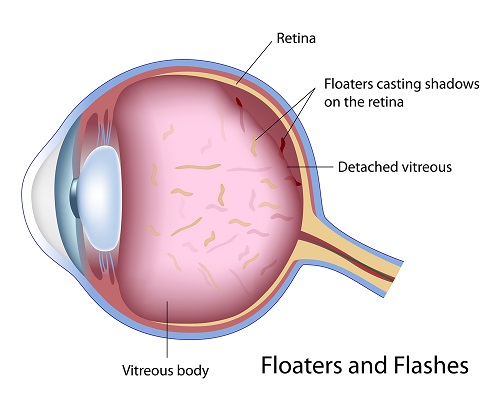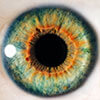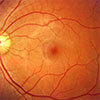Floaters & Flashes
Floaters are Common, Usually Not Bothersome
Most people will notice floaters at some point in their lifetime. The floaters do remain in the eye although they become less noticeable over time as the brain begins to delete the imperfection in vision.
Floaters are shadows cast on the retina (the thin layer of the back of the eye) by debris in the vitreous gel.
The vitreous gel is an optically clear Jello-O-like substance in the back cavity of the eye. This gel degenerates over time and loses its clarity, causing small shadows from the areas that are no longer clear to light. These shadows are seen as floaters of various shapes and sizes.

Too Many Floaters May Signal Trouble
Floaters are most noticeable on a bright sunny day or after a dilated eye exam. It is quite common to notice floaters much more frequently after cataract surgery, as the vision Is much clearer and the shadows can become darker as more light enters the eye.
Floaters are usually not bothersome to the vision. In the rare circumstances where floaters do indeed impair the vision, degenerative vitreous gel can be surgically removed to improve the quality of vision. This would be evaluated and performed by your retina specialist.
A sudden shower of floaters can be a warning sign of a torn retina or abnormal retinal blood vessel. Your eye care specialist should evaluate a new shower of floaters as soon as is practical. The eye care provider also should promptly evaluate the appearance of several new floaters – this can be a warning sign of disease or may be related to normal changes of the eye.
Flashes may indicate retina at risk
Flashes of light are typically seen as lightning bolts or streaks of bright white light in the peripheral vision. They are most commonly noted when the vitreous gel separates from the retina.
This may trigger the flashes of light. This is a warning sign that the retina may be at risk for a retinal tear or detachment. Separation of the vitreous gel occurs in almost everyone eventually; this normal process infrequently requires medical or surgical attention.
New flashes should be evaluated by the eye care specialist within a few days of onset to minimize risk of vision loss.









